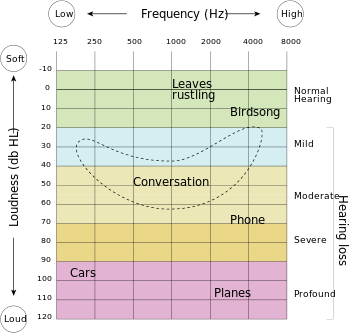 By Supporter Contributor Andrew Lisa
By Supporter Contributor Andrew Lisa
According to the Centers for Disease Control, 35.7 percent – more than one third – of American adults are obese. Defined for adults as having a body mass index – or BMI – of 30 or higher, obesity has long been known as the foundation for a range of serious health problems. Heart disease, stroke, type 2 diabetes, and several cancers can result from the accumulation of excessive body fat.
Now, hearing loss is being attributed to the condition through research conducted by The Harvard Nurses’ Health Study, which tracked a direct correlation between obesity and degraded hearing in women.

A new study reveals that obesity could lead to yet another health risk – hearing loss. Image credit: Andrew Lisa
The Study
The 20-year project tracked more than 68,000 women from 1989 to 2009. Answering detailed questions about their daily habits and general health once every two years, the women’s lives provided a comprehensive glance into long-term progression. In 2009, they were asked if they experienced hearing loss, and if so, when the hearing loss occurred.
The Findings
One out of every six women in the study reported issues with hearing loss at some point during the study. The research displayed a direct correlation between BMI, waist size, and hearing loss. As either variable increased, so did instances of hearing difficulty.
Body Mass Index
BMI, which is a measurement system based on height vs. weight, was a marker for increased instances of hearing loss. Obese women – those with a BMI between 30 and 39 – were between 17 percent and 22 percent more likely to report hearing loss than women who had a BMI of less than 25. For the women who were classified as extremely obese – calculated as having a BMI of 40 or more – the chance of suffering hearing loss went up to a full 25 percent.

Graphical representation of frequency- and loudness-dependence of human hearing loss. (Photo credit: Wikipedia)
Waist Size
The second overwhelming factor that linked obesity to hearing loss was waist size. Women whose waists measured more than 34 inches were about 27 percent more likely to have suffered hearing loss than women whose waists measured under 28 inches. Even after researchers calculated factors in the effects of having a higher BMI, waist size remained a risk factor for hearing loss. The conclusion was that belly fat specifically might have the greatest impact on hearing.
The Antidote: Exercise
The study, published in the American Journal of Medicine, backs up a fact that is evident through both research and basic common sense: Exercise helps. If you think it’s logical that since exercise is known to fight obesity, it must help with hearing loss, you’re right.
If you’re turned off by the idea of joining a gym or going to an exercise class, keep in mind that there are plenty of options for at-home exercise. Equipment such as elliptical machines, rowing machines, or folding cycles aren’t terribly torturous on your wallet, and they give you a great cardio option right at home.

Image Credit: Ablestock
This study’s careful researchers controlled factors known to affect hearing, such as cigarette smoking, medication use, and diet. Even still, an immediate and obvious pattern emerged showing a direct link between obesity and hearing loss. If you didn’t have enough reasons to lose the weight before, this study provides one more.
Andrew Lisa is a freelance writer living in Los Angeles. He writes about health, medical science, and is a content marketing expert.










Elisha Lillian
bitcodavid